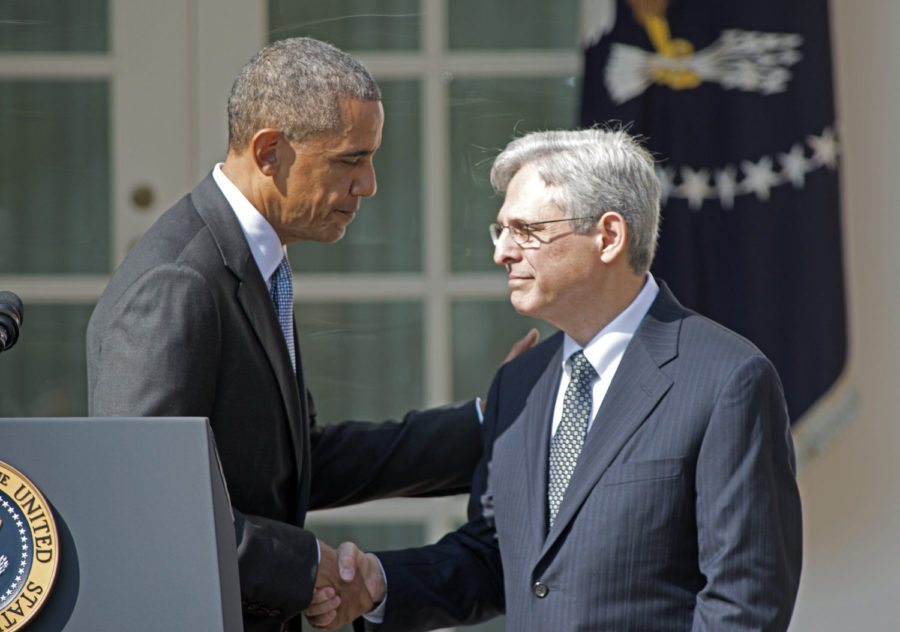Opinion: Will GOP prove that judicial confirmation process is ‘beyond repair’?
March 17, 2016
It’s a shame that a fundamentally decent man is about to become a victim of indecent politics.
By virtually all accounts, President Barack Obama’s nominee to fill the Scalia vacancy on the U.S. Supreme Court, Merrick Garland, is eminently qualified. A majority of Senate Republicans said so themselves in 1997 when he was confirmed to the District of Columbia Court of Appeals, where he has served since and now is the chief judge.
Seven of those Republicans remain in the chamber, including Sen. Orrin Hatch of Utah, who recently expressed his admiration for Garland in predicting — wrongly, as it turns out — that Obama would pick someone far more liberal.
Advertisement
Indeed, the Chicago native is considered something of a centrist — a model of judicial restraint, someone who seeks consensus first, a common-sense Midwesterner who holds the First Amendment up to a broad interpretation, but owns a somewhat more restrictive view of the Second Amendment since the 2008 Heller case, who takes an arguably conservative view of criminal rights and sided with the Bush administration against civilian court relief for the Guantanamo prisoners in 2003.
The Harvard grad drew bipartisan raves for the prominent role he played in the by-the-books prosecution of the Oklahoma City murderers, as well as the investigations of Unabomber Ted Kaczynski and the Atlanta Olympics terrorist. At 63, Garland is old for a Supreme Court nominee, which should put to rest the allegation that Obama is looking to leave his liberal stamp on the nation’s judiciary for a generation or more.
In short, Garland is about as good and palatable a selection as Republicans could have hoped for from a Democratic president, and yet he is doomed.
Senate Majority Leader Mitch McConnell immediately took to the microphone following the president’s announcement to double down on his earlier vow to not even hold hearings not just on Garland but on any nominee from the Obama White House, which is believed to be an unprecedented abdication of the Senate’s advice-and-consent role.
Republicans have indicated they won’t argue qualifications because with Garland, they know they can’t. Republicans have said they won’t attack the person — to use Texas Sen. John Cornyn’s word, to make the nominee their “piñata” — because with the likeable and respected Garland, they know they can’t. Instead they intend to make this about the process, which according to the non-existent “Biden Rule,” holds that no nominee for the Supreme Court can be confirmed in an election year. (Actually, the real “rule” is spelled out in the U.S. Constitution, Article II, Section 2, Clause 2.)
That’s a nice bit of hypocritical nonsense and McConnell knows it, as he gave Joe Biden’s misguided comments in 1992 no thought whatsoever in 2005 when he was chastising Democrats for their “advise and obstruct” position regarding a GOP president’s nominees to the federal bench. Suddenly McConnell wants to “give the people a voice in the filling of this vacancy,” which of course they’ve already exercised twice, in 2008 and 2012.
McConnell can proclaim his position is about principle until they stop mining and burning coal in his Kentucky, but arguably he is again letting his personal contempt for this president— which he first betrayed in 2010 by giving voice to his “one-term president” priority — trump his common sense. That backfired on McConnell and his fellow Republicans then, and this could be another McConnell miscalculation now.
Advertisement*
Indeed, the Senate’s willful inertia and arguable political cowardice on this Supreme Court vacancy could well be a factor in this year’s general election, with 34 Senate seats up, half of them in states Obama carried in 2012, 24 of them now warmed by Republicans. A swing of five puts the Democrats back in effective control of the Senate, with a number of GOP incumbents considered quite vulnerable. We’d suggest the party’s position does not help Sen. Mark Kirk of Illinois.
Beyond that, passing on this moderate is a gamble for Republicans that could come back to bite them long-term. What if Hillary Clinton wins the White House in November? She could nominate Barack Obama for the Supreme Court if she wanted to, or somebody else well to Garland’s left. What if we get a President Trump? Talk about your wild cards. He might nominate his pro-choice federal judge sister.
Of course the ideological balance of the Supreme Court is a big deal, and we appreciate the implications of filling this ninth seat and breaking the current tie. But this is a referendum not just on the judicial branch but on the legislative. Obama is correct that there has been hypocrisy to spare on both sides regarding federal court seats, but a failure to act on this very important one “will indicate a process for nominating and confirming judges that is beyond repair,” with the blame for that falling squarely on those now in power. The only way to change that is for voters to remove them.
___
(c)2016 the Journal Star (Peoria, Ill.)
Visit the Journal Star (Peoria, Ill.) at www.PJStar.com
Distributed by Tribune Content Agency, LLC.
Advertisement









